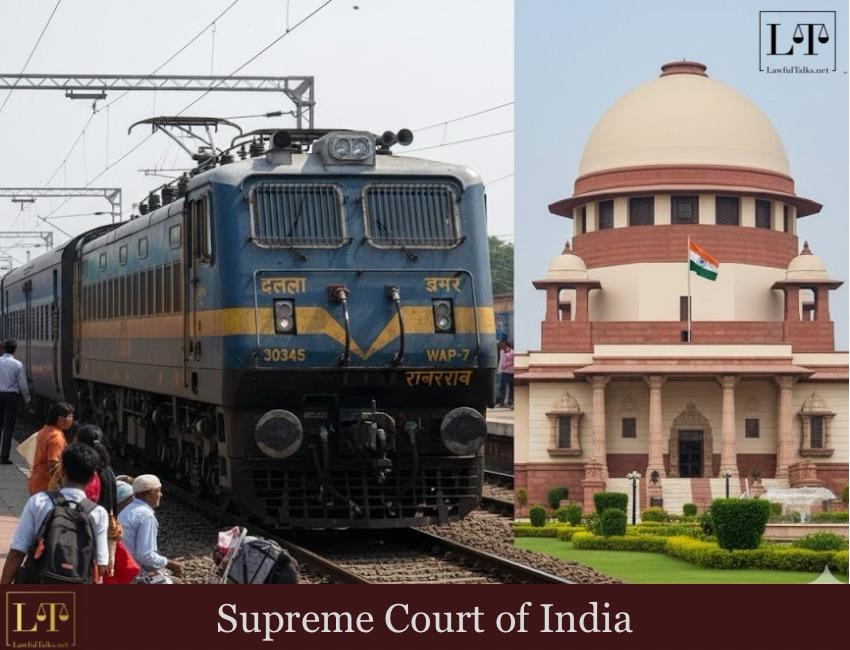Allahabad HC Sets Aside Afzal Ansari's Conviction, Allows Him to Continue as MP

In a significant ruling reinforcing passenger rights, the Supreme Court bench of Justice Aravind Kumar and Justice NV Anjaria has directed the Railways to pay a compensation of Rs. 8 lakhs, along with 9% interest, to the parents of a man who lost his life in a railway accident after mistakenly boarding the wrong train. This verdict reaffirms that minor errors by passengers cannot be used to deny rightful compensation under railway accident claims.

The Court’s decision was a setback for the Railways. The Railways had based their entire defence on claiming that the incident happened because of the deceased’s own negligence, and not due to any fault or deficiency on their part.
Background:
The Railways had claimed that the passenger, who possessed a valid ticket from Satna to Maihar in Madhya Pradesh, accidentally boarded a train that did not have a scheduled stop at his destination. Realising this error, he purportedly attempted to get off the moving train near Maihar station and suffered fatal injuries.
Arguing on this basis, the Railways sought to deny the parents’ claim for compensation under Section 16G of the Railway Claims Tribunal Act, 1987 (“Act”), asserting that the deceased was not entitled to be treated as a bona fide passenger.
Rejecting this reasoning in unequivocal terms, the Supreme Court observed that “merely because the deceased had boarded a wrong train, it cannot be construed that he was not a bona fide passenger so as to absolve the railway authorities from contending that deceased not being a bona fide passenger.” The bench noted that the Railway’s stance lacked any evidentiary backing and pointed to the absence of material establishing negligence on the part of the deceased. The judges further remarked that “no sane person could have attempted to deboard or alight from a running train that too an express train.”
“The railway authorities have taken a plea in the written statement in paragraph 3 that the deceased had jumped off the train, namely, had alighted at the station where he intended to alight, is a plea without proof. Having raised such a plea, it was incumbent upon the railway authorities to prove the same.
However, the DRM Report is also silent on this aspect. For these reasons we are unable to accept the contention of learned ASG. The two members of the tribunal have rightly held that the railway authorities are required to pay the compensation.”, the court held.
With these observations, the Supreme Court allowed the appeal and directed the Respondent-Railway to release the awarded compensation within three months from the date of the order.
Case Details: SHRIKUMAR GUPTA & ANR. VERSUS UNION OF INDIA

Anam Sayyed
4th Year, Law Student
Latest Posts
Categories
- International News 19 Posts
- Supreme Court 390 Posts
- High Courts 383 Posts
SC: Wrong Train, Still Right To Compensation—Railways Held Fully Accountable For ‘Baseless’ Defense

- Anam Sayyed
- November 19, 2025
In a significant ruling reinforcing passenger rights, the Supreme Court bench of Justice Aravind Kumar and Justice NV Anjaria has directed the Railways to pay a compensation of Rs. 8 lakhs, along with 9% interest, to the parents of a man who lost his life in a railway accident after mistakenly boarding the wrong train. This verdict reaffirms that minor errors by passengers cannot be used to deny rightful compensation under railway accident claims.
The Court’s decision was a setback for the Railways. The Railways had based their entire defence on claiming that the incident happened because of the deceased’s own negligence, and not due to any fault or deficiency on their part.
Background:
The Railways had claimed that the passenger, who possessed a valid ticket from Satna to Maihar in Madhya Pradesh, accidentally boarded a train that did not have a scheduled stop at his destination. Realising this error, he purportedly attempted to get off the moving train near Maihar station and suffered fatal injuries.
Arguing on this basis, the Railways sought to deny the parents’ claim for compensation under Section 16G of the Railway Claims Tribunal Act, 1987 (“Act”), asserting that the deceased was not entitled to be treated as a bona fide passenger.
Rejecting this reasoning in unequivocal terms, the Supreme Court observed that “merely because the deceased had boarded a wrong train, it cannot be construed that he was not a bona fide passenger so as to absolve the railway authorities from contending that deceased not being a bona fide passenger.” The bench noted that the Railway’s stance lacked any evidentiary backing and pointed to the absence of material establishing negligence on the part of the deceased. The judges further remarked that “no sane person could have attempted to deboard or alight from a running train that too an express train.”
“The railway authorities have taken a plea in the written statement in paragraph 3 that the deceased had jumped off the train, namely, had alighted at the station where he intended to alight, is a plea without proof. Having raised such a plea, it was incumbent upon the railway authorities to prove the same.
However, the DRM Report is also silent on this aspect. For these reasons we are unable to accept the contention of learned ASG. The two members of the tribunal have rightly held that the railway authorities are required to pay the compensation.”, the court held.
With these observations, the Supreme Court allowed the appeal and directed the Respondent-Railway to release the awarded compensation within three months from the date of the order.
Case Details: SHRIKUMAR GUPTA & ANR. VERSUS UNION OF INDIA

Anam Sayyed
4th Year, Law Student
Latest Posts
Categories
- International News 19 Posts
- Supreme Court 390 Posts
- High Courts 383 Posts


















































































































































































































































































































































































































































































































































































































































































































































































































